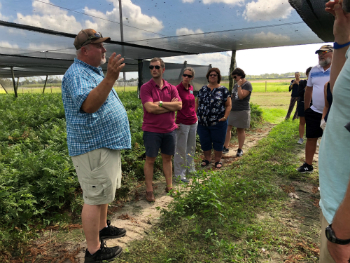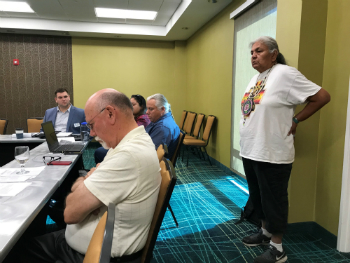NACD, NCF LAUNCH CAMPAIGN FOR NEXT GENERATION OF CONSERVATION LEADERS

The National Conservation Foundation (NCF) and the National Association of Conservation Districts (NACD) launched a campaign yesterday to support the development of the next generation of conservation leaders. The Next Generation Leadership Campaign seeks to raise $100,000 by Dec. 31, 2018 to create an endowed fund for leadership development to cultivate future leaders in the conservation district community. This endowed fund will provide crucial resources to engage, educate and develop the next generation of conservation leaders.
“Getting emerging leaders involved and providing them with the tools, resources, training and advice necessary to become future conservation leaders is crucial to the sustainability of organizations like NCF and NACD,” said NCF Chairman Steve Robinson.
The campaign will support a program for next generation leaders, which will officially launch in February at the 2019 Annual Meeting. The program will be guided by an advisory committee; provide trainings, meetings and webinars for leadership participants; and facilitate face-to-face opportunities for leadership participants at NACD meetings.
Please consider donating to this important endeavor. Contributions will be matched dollar-for-dollar by a generous benefactor to help give participants the tools they need to be the best leaders for the conservation community.
NACD GOVERNMENT AFFAIRS UPDATE
On Sept. 27, the U.S. House Committee on Natural Resources advanced four bills to help modernize the Endangered Species Act (ESA). In July 2018, NACD President Brent Van Dyke sent a letter to Rep. Paul Gosar (R-AZ) highlighting the significant need to update the ESA and emphasize the significance of local decision-making and voluntary conservation. After successfully passing out of committee, these four bills are pending consideration by the whole House.
As of Monday, Oct. 1, the 2014 Farm Bill officially has expired with no new reauthorization. NACD’s Government Affairs team released a blog post last Friday explaining what that means both for current farm bill programs operated by USDA, as well as what is expected moving forward as Congress works to pass a new farm bill.
Congress also passed, and President Trump signed, an extension of funding for USDA and the Department of the Interior until Dec. 7, 2018. While Congress was able to pass a small handful of year-long funding bills for the entirety of fiscal year 2019, they did not include these two agencies which conservation districts interact with the most. With the midterm elections coming up in approximately a month, Congress will have limited time between now and Dec. 7 to pass a further extension. However, discussions between the House and Senate have indicated that concerns about a future federal government shutdown are not currently warranted.
STATE ASSOCIATION EXECUTIVE DIRECTORS CONVENE IN FLORIDA
On Sept. 25-28, leaders from across the nation met in Daytona Beach, Fla., for the 2018 NACD State Association Executive Directors Annual Conference. During the conference, the executive directors participated in roundtable discussions exploring different programs, projects, initiatives, challenges and events in each of the states. Attendees established face-to-face connections, providing a network of peers that can be utilized throughout the year as each executive director faces challenges or questions.

Xavier Montoya, the USDA NRCS Acting Southeast Regional Conservationist, provided program updates to attendees and discussed aspects of NRCS’ partnership with conservation districts. Clegg Hooks, Deputy Director of the Florida Office of Agricultural Water Policy, highlighted conservation efforts throughout the state, explaining the challenges they face and showcasing some of the valuable resources they utilize such as Best Management Practices (BMP) Manuals.
NACD North Central Region Representative Beth Mason led the executive directors in jumpstarting a training program, exploring the different “hats” they wear within the state association. This initiative explores the roles outlined their job descriptions, assesses their training needs, and gathers and develops resources to directly address each area. The conference wrapped up with a half-day of local agricultural conservation tours at the Fern Trust, Inc. and the Evans Farm – one of only two caviar farms in the U.S.
TRIBAL RPG MEETS IN WASHINGTON STATE
On Sept. 17, the NACD Tribal Outreach and Partnership (TOP) Resource Policy Group (RPG) met during the joint Pacific and Southwest Regions meeting in Kennewick, Wash. NACD President-elect Tim Palmer and board members from both regions addressed meeting participants. Tribal members from the Cowlitz, Wanapum, Makah and Yakima Tribes gave presentations about their ancestral homelands, tribal treaty rights, traditional food gathering, invasive species issues, and fisheries habitat restoration projects in the Snake, Salmon and Columbia watersheds.

Makah Tribal Council Vice Chairman Greig Arnold described the Tribe’s work with the Natural Resources Conservation Service (NRCS) regarding whaling and treaty rights in relation to delivery of NRCS programs. The Makah Tribe is working with NRCS to develop a matrix for program participation requirements to assist tribal members with accessing NRCS programs and technical assistance. National Conservation District Employees Association (NCDEA) Pacific Region Representative Tom Salzer described the NCDEA board’s recently approved bylaws change to clarify representation of tribal conservation district employees. NACD President Brent Van Dyke approved the nomination of Jerry Smith of Virginia to replace Patty Lambrecht as the Southeast Region Representative to the TOP RPG. The RPG has two vacancies in the South Central and Northeast Regions – please contact your region chair if you know any good candidates.

In northwest Kansas, Larry Manhart, his wife Janice, son Doug and daughter-in-law Stephanie farm approximately 3,000 acres of wheat, corn and fallow land/cover crop rotation and manage 1,000 acres of grass for grazing.
The Manharts are committed to eliminating tillage and minimizing soil disturbance, starting with no-till practices about 20 years ago. Within the last 10 years, Manhart has experimented with cover crop mixes and new ideas and practices as the conditions in his fields allow.
Monitoring organic matter through soil testing has helped Manhart see the positive impacts of his efforts. He has realized this is a long-term process, taking small steps in the right direction every year. Manhart has seen less variability in yield, better weed suppression and improved water infiltration and carrying capacity. He says his crops also seem to “hang on longer during extended drought periods.”
Additionally, Manhart has incorporated grazing cattle into his operation, buying stocker calves in the winter to graze the cover crops. His son Doug says reducing compaction is just a matter of taking the time to frequently move the herd.
To read more about Larry Manhart, his operation, his experiences and challenges in his soil health journey, be sure to visit his Soil Health Champion Profile. If you or someone you know would like to be a part of the NACD Soil Health Champions Network, contact North Central Region Representative Beth Mason, for more information at beth-mason@nacdnet.org or 317-946-4463.
|
|
|
|
|
Email Marketing By
|


|
|
|
|
|